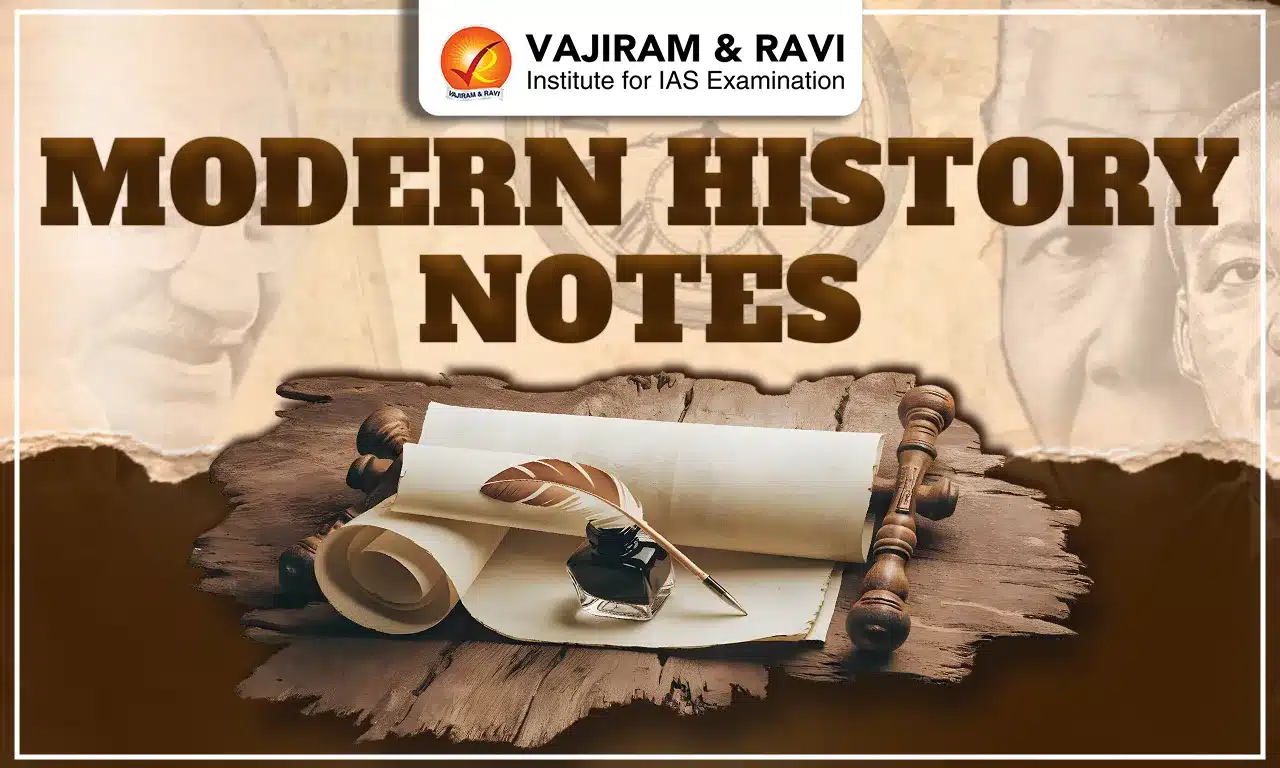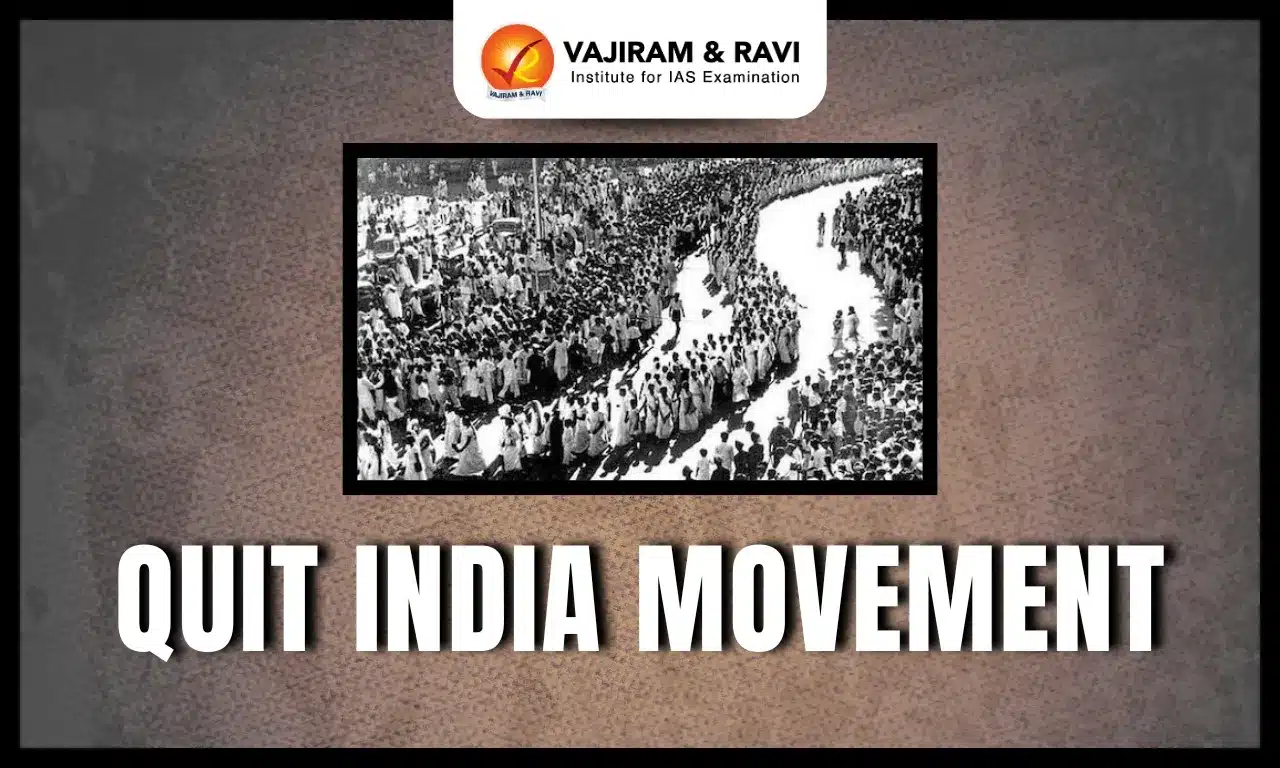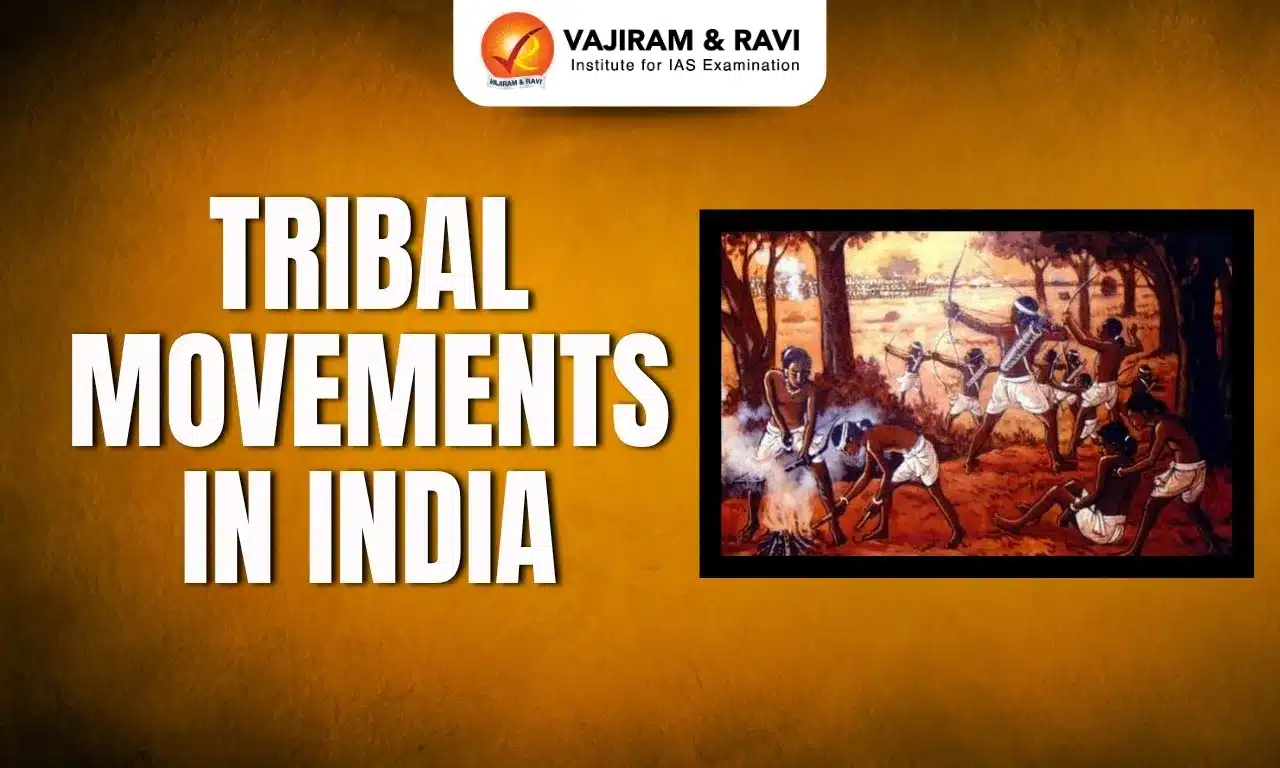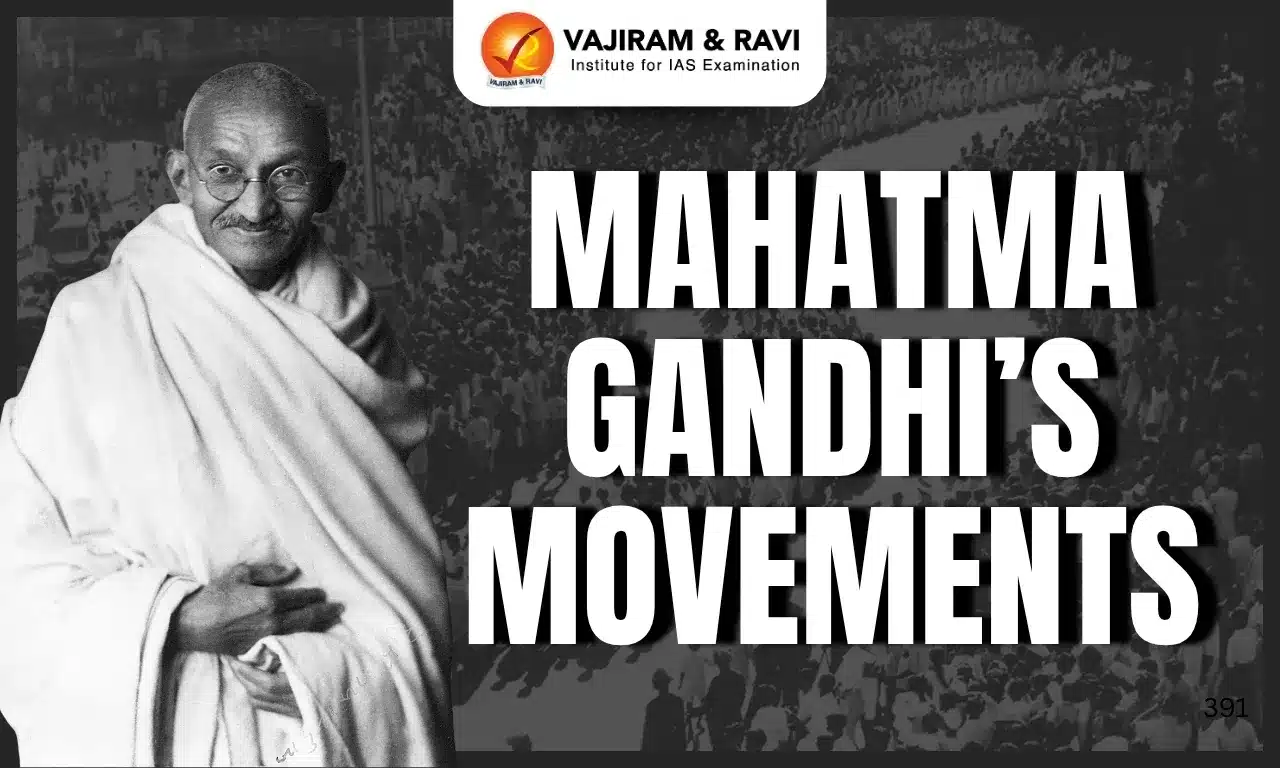Modern Indian History Notes for UPSC are a very crucial resource for the candidates who are planning to appear for the UPSC CSE 2026. These notes include India's transformation from colonial rule to independence and key movements shaping the nation’s history. UPSC Modern Indian History Notes are prepared by the best faculty and subject experts aligning perfectly with UPSC requirements, offering aspirants a reliable resource for Modern Indian History.
UPSC Modern Indian History Notes
Modern Indian History is an important subject for UPSC CSE 2026, including India's struggle for independence and socio-political transformation. Vajiram and Ravi offer UPSC Modern Indian History Notes, which are concisely prepared for aspirants with syllabus-aligned content.
UPSC Modern Indian History
The UPSC CSE Exam 2026 is one of the most prestigious annual exams. For both Prelims and Mains, having well-structured UPSC Modern Indian History Notes, covering the 18th century to independence in 1947, is essential. These notes simplify complex events and highlight important movements and leaders, making them a trusted resource for aspirants.
Advent of Europeans in India
This section explores the advent of various Europeans which began in 1498, highlighting the discovery of a sea route to India around Africa by the Portuguese explorer Vasco da Gama.
- Advent of Europeans in India
- Portuguese in India
- Cartaz System
- Dutch in India - Colonies and Settlement
- British East India Company
- French in India
- Danish East India Company
- Portuguese in India
Establishment of British Rule in India - Colonialism in India
This section explores the Establishment of British Rule in India, highlighting Colonialism in India when the British ruled in India through the foundation East India Company, which began to arrive in India in the 16th century.
- Establishment of British Rule in India - Colonialism in India
- Battle of Plassey
- Battle of Buxar
- Dual Government in Bengal
- Anglo-Mysore Wars
- Anglo Maratha Wars
- Anglo Sikh Wars
- Anglo Nepal War
- Anglo Burmese War: First Anglo Burmese War, Second Anglo Burmese War
- Anglo-Afghan War
- Impact of British Rule in India
Acts and Regulations under East India Company
These UPSC Modern Indian History Notes include the Acts and Regulations under East India Company:
- Acts and Regulations under East India Company
- Regulating Act 1773
- Pitt's India Act 1784
- Charter Act 1813
- Charter Act 1833
- Charter Act 1853
- Government of India Act 1858
- Indian Councils Act 1861
- Indian Councils Act 1892
- Morley Minto Reforms - Indian Councils Act 1909
- Government of India Act 1919 - Montagu Chelmsford Reforms
- Government of India Act 1935
- Indian Independence Act 1947
British Policies in India
This section of Modern Indian History Notes for UPSC includes the British Policies in India that impacted society in many ways.
Governor General and Viceroy of India
This section outlines the key figures and policies of the British administration in India, highlighting the significant contributions and reforms made by various Governors-General and Viceroys. Their actions had profound impacts on Indian society, economy, and governance.
- Governor General and Viceroy of India
- Warren Hastings
- Lord Cornwallis
- Lord Wellesley
- Lord William Bentinck
- Lord Dalhousie
- Doctrine of Lapse
- Widow Remarriage act
- Wood's Despatch 1854
- Lord Canning
- Lord Lytton
- Lord Ripon
- Lord Curzon
Civil Uprisings Before 1857
This section explores the early civil uprisings in India that took place before the significant Revolt of 1857. These uprisings, driven by various social, economic, and political factors, highlighted the growing discontent against British colonial rule and set the stage for later, larger movements.
Tribal Revolts - Tribal movements in India, their causes and impact
This section of the notes includes the Tribal Revolts which started in India due to land alienation, economic exploitation, cultural suppression, denial of rights, forest policies, lack of development, injustice, and the influence of national movements.
Revolt of 1857
The Revolt of 1857, also known as the Indian Rebellion of 1857 or the First War of Independence. It explores events and leaders of the Revolt of 1857.
Indian National Congress - Foundation
This section of Modern Indian History Notes for UPSC includes the formation of the Indian National Congress and how it provided a unified platform for Indians.
Peasant Movements
This section of Modern Indian History Notes for UPSC includes peasant movements as social movements that aim at securing the rights of peasants related to agricultural policy.
Socio-Religious Reform Movements
This section includes the Socio-Religious Reform Movements that emerged during the 19th and early 20th centuries to challenge social injustices and outdated customs.
- Socio-Religious Reform Movements
- Raja Ram Mohan Roy
- Swami Vivekananda
- Ramakrishna Mission
- Arya Samaj
- Dayanand Saraswati
- Young Bengal Movement
- Ishwar Chandra Vidyasagar
- Prarthana Samaj
- Gopal Hari Deshmukh
- Dharma Sabha
- Theosophical Society
- Aligarh Movement
- Wahabi Movement
- Faraizi Movement
- Deoband Movement
- Ahmadiyya Movement
- Akali Movement
- Kuka Movement | Namdaris
- Jyotiba Phule - Satyashodhak Samaj
- Savitribai Phule
- Paramahansa Mandali
- Pandita Ramabai
- SNDP Movement - Sree Narayana Guru
- Justice Party
- Self Respect movement
- Temple Entry Movement
- Dr Bhimrao Ambedkar
Extremists - Rise of extremism in Indian National Movement
This section of the Modern Indian History Notes for UPSC includes the Rise of extremism in Indian National Movement
Swadeshi Movement
This section includes the Swadeshi movement which was a self-sufficiency movement that began in India in 1905 to protest the British partition of Bengal.
Mahatma Gandhi
This section covers the life and contributions of Mahatma Gandhi. His unique approach to non-violent resistance, known as Satyagraha, played a crucial role in challenging British colonial rule and inspiring global movements for civil rights and freedom.
Home Rule movement
This section includes the Home Rule movement which lasted around two years between 1916–1918.
Non Cooperation movement
This section of the Modern Indian History Notes for UPSC includes the Non-Cooperation Movement which was launched by Mahatma Gandhi on 4th September 1920. It was a political campaign aimed at urging Indians to withdraw their support for the British government.
Civil Disobedience Movement - Dandi March and Salt Satyagraha
This section of the Modern Indian History Notes for UPSC includes the Civil Disobedience Movement (CDM), launched in 1930, was a non-violent protest against British colonial rule in India which was led by Mahatma Gandhi, it sought to challenge unjust British laws, particularly the salt tax, through acts of peaceful march like the Salt March.
Revolutionary Movement in India - Revolutionary Activities
This section of the Modern Indian History Notes for UPSC includes the revolutionary movement in India which was a militant and underground movement focused on ending British colonial rule and establishing self-government.
Communist Party of India
These UPSC Modern Indian History Notes include the Communist Party of India and related cases.
Quit India Movement
These UPSC Modern Indian History Notes cover the Quit India Movement, which was launched by Mahatma Gandhi at the Bombay session of the All India Congress Committee on 8th August 1942, during World War II.
Freedom Fighters of India
This section provides insights on the Freedom Fighters of India. Through courage and determination, freedom fighters left an indelible mark on history. Their contributions ranged from revolutionary activities and political leadership to social reforms and mass mobilization, each adding a unique facet to the freedom struggle.
- Fighters of India and Their Contribution
- Role of Women In Indian Freedom Struggle
- Role of Working Class in the Indian National Movement
- Role of Indian Capitalists in Freedom Struggle
- Role of Press - Newspapers during Freedom Struggle
Last updated on February, 2026
→ UPSC Notification 2026 is now out on the official website at upsconline.nic.in.
→ UPSC IFoS Notification 2026 is now out on the official website at upsconline.nic.in.
→ UPSC Calendar 2026 has been released.
→ Check out the latest UPSC Syllabus 2026 here.
→ Join Vajiram & Ravi’s Interview Guidance Programme for expert help to crack your final UPSC stage.
→ UPSC Mains Result 2025 is now out.
→ UPSC Prelims 2026 will be conducted on 24th May, 2026 & UPSC Mains 2026 will be conducted on 21st August 2026.
→ The UPSC Selection Process is of 3 stages-Prelims, Mains and Interview.
→ Prepare effectively with Vajiram & Ravi’s UPSC Prelims Test Series 2026 featuring full-length mock tests, detailed solutions, and performance analysis.
→ Enroll in Vajiram & Ravi’s UPSC Mains Test Series 2026 for structured answer writing practice, expert evaluation, and exam-oriented feedback.
→ Join Vajiram & Ravi’s Best UPSC Mentorship Program for personalized guidance, strategy planning, and one-to-one support from experienced mentors.
→ UPSC Result 2024 is released with latest UPSC Marksheet 2024. Check Now!
→ UPSC Toppers List 2024 is released now. Shakti Dubey is UPSC AIR 1 2024 Topper.
→ Also check Best UPSC Coaching in India
UPSC Modern Indian History Notes FAQs
Q1. What should I study in modern history for UPSC?+
Q2. What is the modern history of India?+
Q3. What is the syllabus of modern history for UPSC?+
Q4. Which book to read for Modern India UPSC?+
Q5. Is NCERT sufficient for UPSC history?+
Tags: Modern Indian History Notes Modern Indian History Notes for UPSC UPSC

















